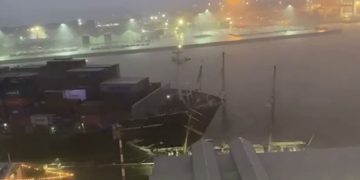Transport Malta’s Marine Safety Investigation Unit has issued an investigation report into a failure of a top cover bolt of a cargo manifold blind flange valve, resulting in an oil spill on deck, during cargo operations in the port of Genoa, Italy 21 August 2023.
On 21 August 2023, FT Sturla was moored at the port of Genoa, Italy, to unload a cargo of low-sulphur fuel oil (LSFO). At 0700, a ship-shore safety meeting took place between the chief officer and the loading master, during which it was agreed that the maximum pressure to be maintained at the vessel’s manifold, throughout the unloading period, would be 7.0 bar.
Following relevant checks and preparations, the unloading operation commenced at 1030. The cargo was being pumped out from cargo tank nos. 5 port
and starboard, through the common pipeline manifold valve on the starboard side. Following a confirmation that all was in order on board and ashore, the unloading pressure was gradually increased to 6.8 bar at the vessel’s manifold. At 1230, however, one of the able seafarers – deck (A/B), noticed an oil leak from the common pipeline on the port side. He immediately notified the cargo control room (CCR) via his portable radio, following which, he pressed the emergency shutdown button at the port side manifold.
The chief officer, who happened to be in the CCR at that time, instructed the crew member stationed at the vessel’s manifold to shut the starboard manifold valve. He then advised the master and the terminal about the oil leak and activated the general alarm.
The master notified the vessel’s managers (the Company) and relevant authorities, while the crew members implemented oil spill contingency measures. Several crew members rigged up an oil boom around the vessel, to restrict the spread of the oil, in the event that any of it was spilled overboard. In the meantime, other crew members began to contain and collect the leaked oil on board.
Cause of the Oil Spill
During their investigation on the source of the oil spill, the crew members found that one of the top cover bolts of a blind flange valve of cargo tank no. 5 starboard, on the port side manifold, had failed. Consequently, the cargo being pumped out, leaked from the top of the valve. The bolt was observed to have fractured at the beginning of the bottom threaded portion.
Conclusions of the Laboratory Analysis
The laboratory analysis report concluded that the fracture could be associated with stress corrosion cracking (SCC) phenomenon, in a chlorides-containing humid environment (marine). SCC is typically related to synergistic factors, such as an aggressive environment, a static stress field applied to a component and susceptible fabrication material.
Chlorides-induced SCC phenomena in austenitic stainless steel, are typically in the form of transgranular and significantly branched cracks that can propagate at a relatively fast rate (30 mm, or more, per year), especially in severe aggressive environments. The fabrication material of an AISI 303 (sulphur-rich) austenitic stainless-steel bolt was not adequate to resist corrosion and SCC in humid marine environments.
Safety actions taken during the course of the safety investigation
Following the occurrence, the Company renewed the top cover bolts of all blind flange valves at the manifolds.





























































